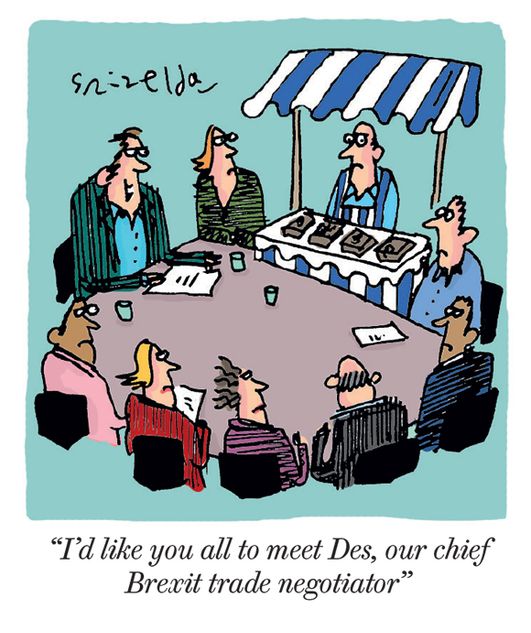Over the past few months, the arguments of the European Union referendum campaign—and the exaggerations of all sides—have started to give way to a focus on the more practical consequences of the electorate’s historic vote to leave the EU after over 40 years. It appears that our new status—that of a country about to exit the EU—could make the UK an appealing partner for countries that have either been (unsuccessfully) seeking a trade deal with the EU, or view the current period as an opportunity to build closer ties with the UK. China, India, Brazil and the Gulf countries, amongst others, have all been in active discussion with UK politicians over the last few months. But what are the opportunities that closer trade links with these countries would present? And why are these emerging markets of such potential interest to the UK when trade with the EU is, and will remain, a significant part of our export and import activities? India Since the EU referendum result, there has been much discussion of the possibility of a Free Trade Agreement between India and the UK. Certainly, when it comes to investment, the UK has been the largest G20 investor in India since 2000, and UK companies currently employ around 691,000 people across the country. India was the third-largest source of foreign direct investment in the UK in terms of the number of projects in 2014-15 and 2015-16. However, when it comes to trade, the UK did not feature in India’s top 10 trading partners in 2015-16, ranked 12th. “On the face of it, UK-India trade is performing well—growing at 170 per cent between 2004 and 2014. But as India’s overall trade grew by 800 per cent in the same period, there is clearly tremendous potential,” says Kevin McCole, Chief Operating Officer at the UK India Business Council. “The issue is that most UK businesses still do not see India as a market. This is a mistake, not least as what the UK has—consumer goods, world-leading technology, know-how, finance—India wants.” Despite the UK being the second-largest exporter of services in the world, and India having the second-fastest growing services sector, with compound annual growth of 9 per cent, trade in services between the two countries is disappointingly low. Britain’s £2.2bn of services exports to India accounted for just 1 per cent of its global total in 2014, and only 7 per cent of its services exports to Asia. China UK services exports to another Asian powerhouse, China, were worth £3.2bn in 2014. In fact, despite an overall trade deficit of £19.6bn, the UK has a surplus with China on trade in services. Over the past few years, the relationship between the two countries had become much closer, thanks in part to the courtship of George Osborne. The former Chancellor wished to make China the UK’s second largest trading partner by 2025 and this intention was recently carried forward by the approval of Hinkley Point C, as well as further diplomatic discussions between the two countries on the topic of a post-Brexit relationship. As with India, this state of affairs raises the question: despite increased investment between the two countries, is there still potential for increased trade? The answer, unequivocally, is yes. Despite China’s recent growth deceleration, it remains committed to doubling its per capita economic output by 2020, while its growing middle class is set to top 600m people in the same timeframe. Considering that this middle class is more than 10 times the size of the UK population, China’s increasing purchasing power is not to be underestimated. The number of households in China with an annual disposable income above $10,000 will almost quadruple from 57.1m to 222m by 2020. As a result, the country has seen a recent shift towards consumption-orientated growth, away from a previous focus on infrastructure projects. With China’s increasing demand for high-quality goods and services, it is worth noting that the “Made in Britain” brand carries significant cachet in China, and could be used to greater advantage.
"China remains committed to doubling its per capita economic output by 2020, while its growing middle class is set to top 600m"
“This is a key time for UK-China trade, arguably where the UK has its strongest competitive advantage since China’s opening up,” says David Martin, Director of China-Britain Business Council. “The thirst for the UK’s world-renowned goods and services in China is well-known, but there are added opportunities for a much broader spectrum of UK industries in China. As China moves its manufacturing up the value chain, under the umbrella of a large government drive called ‘Made in China 2025,’ there are opportunities for collaboration in the advanced manufacturing, engineering, life sciences, transport and environmental sectors.”
![© Celso Diniz/Rex Shutterstock]() © Celso Diniz/Rex Shutterstock
© Celso Diniz/Rex Shutterstock
©Celso Diniz/Rex Shutterstock
Brazil Antônio Carlos Jobim, composer of “The Girl from Ipanema,” once said: “Brazil is not for beginners.” That has long applied to companies seeking to trade there. However, in the short space of three months, the current government of Michel Temer has made it clear that Brazil is open for business. It intends to exit the infrastructure sector and create a friendlier business environment for private investors, including non-Brazilians. Doing so could significantly increase the already colossal US$66bn investment planned for Brazilian ports, airports, roads and rail. Water and sanitation, once a closed shop, should now open for foreign investment, products and services. Mid-tier Brazilian construction services companies who work on these projects are consolidating, modernising, implementing corporate governance codes, and would welcome trusted high-quality UK engineering businesses that bring investment, know-how and technology. The Brazilian government has expressed keen interest in a UK trade deal through the Mercosur free trade organisation. UK companies who sell in the UK to Unilever, Shell, AstraZeneca, BAT, or to any other large or medium-sized UK company, should find them all waiting for them in Brazil with open arms. “Brazil’s large internal markets can be a great place for UK companies,” says Richard Taylor, President of Brazilian venture development company TEC Ventures, and a British Chambers of Commerce Brazil Councillor. “The UK brand is strong and broadly respected, but you need also to be extremely competitive and patient to be successful. “After a difficult few years of economic, political and corruption issues grabbing the headlines, there are many problems to solve with infrastructure, energy, water and other areas in which UK companies can help. There are now signs of increasing confidence in Brazil and investors are already looking very positively at the country’s relative resilience and sheer scale of opportunities.”
![© Celia Peterson/Getty Images]() © Celia Peterson/Getty Images
© Celia Peterson/Getty Images
©Celia Peterson/Getty Images
Gulf Region If, a few years ago, Russia would have been the logical region to focus on alongside China, India and Brazil, these days, it is the Middle East, and particularly the Gulf region, that is regarded as one of the key trading partners for the UK. Since becoming Secretary of State for Trade and Investment, Liam Fox has visited Dubai twice, and travelled to Bahrain and Qatar. This is no surprise, considering that UK exports to the Gulf Co-operation Council countries were more than £22bn in 2015, in spite of frequently raised concerns by human rights campaigners. The United Arab Emirates itself is the UK’s fourth-largest market outside Europe, particularly due to its status as a global trans-shipment hub, and there is discussion of a potential future free trade agreement with the Gulf States. In the meantime, Liam Fox has identified 31 “big-ticket” opportunities for British companies in the Gulf states, covering not only traditional industries such as oil and gas or defence and infrastructure, but also emerging areas like life sciences and creative industries. “All Gulf economies are going through restructuring and diversification following the oil price drop, and this is creating opportunities for UK expertise and professional services, including infrastructure finance and management, education and healthcare,” says Chris Innes-Hopkins, UK Executive Director of the Saudi British Joint Business Council. For instance, Qatar, whose growth had been based on its petroleum and natural gas industries, is now developing into a significant regional financial and educational centre. The UAE has a well-established and thriving services and financial sector. Saudi Arabia, for its part, is opening up opportunities in healthcare, construction and education as it looks to diversify its economy by creating new cities.
"A few years ago Russia would have been the region to focus on along with China, India, Brazil. Now it's the Gulf states"
It is clear that there are many opportunities for UK exporters to increase trade with emerging markets. However, it would be naïve to deny the challenges—cultural, legal and operational—that come with working in a new market. High-level discussions and statements by politicians are essential for raising awareness, as well as helping secure major contracts but there is an equally critical need for business-to-business support. For many firms, barriers to entry may even be lower in less high-profile markets such as in South East Asia or Latin America, than in the BRICs, which have captured a disproportionate share of attention in recent years. UK Chambers of Commerce across the UK offer links to partners based in many markets, with strong local knowledge of distributors, customers and British companies operating in the country, ready to provide advice and help secure business. Whatever the ultimate terms of Brexit, new Free Trade Agreements remain a good few years away, political rhetoric notwithstanding. With lower sterling offering many British exporters greater competitiveness, and firms increasingly looking overseas as they consider their Brexit business plans, major emerging markets are increasingly on the business radar. The big question is whether businesses here choose to capitalise on the opportunities and goodwill in these markets. This is by no means a foregone conclusion. Only a deep partnership between business and government can help more UK businesses make that leap—a partnership that will need to last decades as Britain redefines how it trades with the world. To learn more about support offered by British Chambers and Business Groups in emerging markets, visit:
www.exportbritain.org.uk and
www.britishchambers.org.uk
![cartoon3]()
![brext-britain-logo]()
On the 17th of January 2017, Prospect hosted a roundtable discussion with the contributors to: Brexit Britain: the trade challenge. This report is designed to act as a guide for parliamentarians, officials and businesses with a stake in the UK’s changing relationship with the world following Brexit. The discussion was chaired by Tom Clark, Editor of Prospect. Participants included Tasmina Ahmed-Sheikh MP, Miriam González and Vicky Pryce. To find out more about how you can become involved in Prospect’s Trade Challenge programme, please contact david.tl@prospect-magazine.co.ukYou can also receive the full “Brexit Britain: the trade challenge” report as a fully designed PDF document. To do so, simply enter your email below. [prosform fields="email,forename,surname" signupcode="Trade" countrycode="GB" redirect="brexit-britain-the-trade-challenge-is-yours"] When you sign up for this free report, you will also join our free Prospect newsletter. Prospect takes your privacy seriously. We promise never to rent or sell your e-mail address to any third party. You can unsubscribe from the Prospect newsletter at any time
















